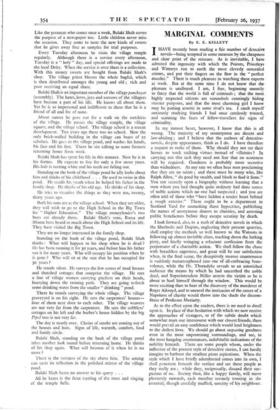MARGINAL COMMENTS
By E. E. KELLETT
IHAVE recently been reading a fair number of detective novels—being tempted in some measure by the cheapness and clear print of the reissues. As is inevitable, I have admired the ingenuity with which the Poirots, Priestleys and Wimseys run to earth the most cleverly concealed crimes, and put their fingers on the flaw in the " perfect murder." There is much pleasure in watching these experts at work. But at the same time I do not know that the pleasure is unalloyed. I am, I fear, beginning uneasily to fancy that the world is full of criminals ; that the most highly respected citizens are scoundrels cunningly hiding sinister purposes, and that the most charming girl I know may be putting arsenic in some rival's tea. I catch myself anxiously studying friends I had once carelessly trusted, and sunning the faces of fellow-travellers for signs of criminality.
In my inmost heart, however, I know that this is all wrong. The majority of my countrymen are decent and law-abiding ; and I believe that the authors of detective- novels, despite appearances, think as I do. I have therefore a request to make of them. Why should they not set their heroes to work stalking virtues instead of villainies ? In carrying out -this task they need not fear that no acuteness will be required. Goodness is probably more secretive than wickedness. At any rate we often hear men proclaiming that they are no saints ; and there must be many who, like Ralph Allen, " do good by stealth, and blush to find it fame." You can scarcely open a biography without learning that .a man whom you had thought quite ordinary had done scores of noble actions which no one had suspected ; and you are often told of those who "have hidden a tender heart behind a rough exterior." There ought to be a department in Scotland Yard for unmasking these hypocrites, publishing the names of anonymous donors to charities, and arresting public benefactors before they escape scrutiny by death.
I look forward, also, to a rush of detective novels in which the Sherlocks and Dupins, neglecting their present quarries, shall employ the methods so well known to the Watsons in following up almost invisible clues, tracking down the lurking piety, and finally wringing a reluctant confession from the perpetrator of a charitable action. We shall follow the chase with breathless eagerness, and great will be our satisfaction when, in the final scene, the deceptively morose countenance is suddenly metamorphosed into one of all-embracing bene- volence, while the Dr. Thorndyke reveals to an astonished audience the means by which he had unearthed the noble deed, and Superintendent Miller arrests the victim as he is about to hurl himself through the window. This would be more exciting than to hear of the discovery of the murderer of Roger Aikroyd, and to unravel the intricacies of the career of a Napoleon of charity would throw into the shade the discom- fiture of Professor Moriarty.
As to the effect upon the readers, there is no need to dwell upon it. In place of that hesitation with which we now receive the approaches of strangers, or of the subtle doubt which somewhat mars our intercourse with our closest friends, there would prevail an easy confidence which would lend brightness to the dullest lives. We should go about suspecting goodness even in the most unpromising surroundings, and see, in the most hangdog countenances, indubitable indications of the nobility beneath. There are some people whom, under the influence of the present style of detective stories, I can hardly imagine to harbour the smallest pious aspirations. When the style which I have briefly adumbrated comes into its own, I shall penetrate beneath the surface and see these people as they really are ; while they, reciprocally, discard their sus- picions of me. Society then, like a happy family, will move pleasantly onwards, each member serenely trusting in the essential, though carefully muffled, sanctity of his neighbour. • •


















































 Previous page
Previous page